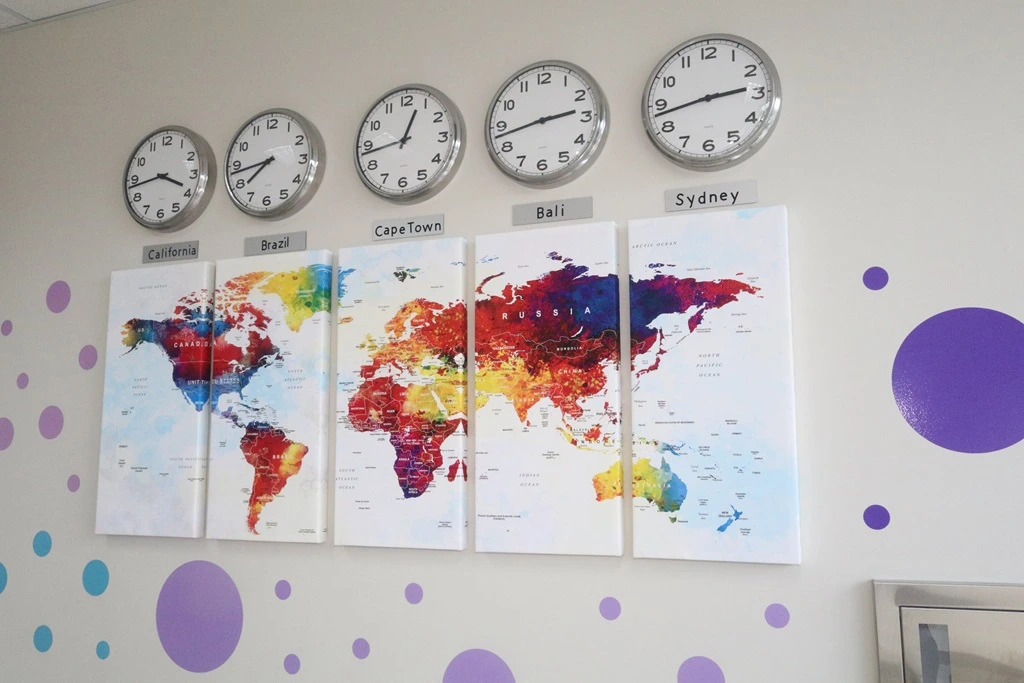Global business doesn’t run on a single clock. Companies today interact with clients, employees, and partners across different regions, making time zones an unavoidable part of daily operations. What may seem like a challenge at first can actually be an advantage. Managed effectively, the advantages of time zones allow businesses to work smarter, respond faster, and grow across borders.
In the sections ahead, we’ll look at how these advantages shape operations, customer service, and overall competitiveness in today’s interconnected economy.

The Global Business Landscape and the Role of Time Zones
Today’s digital economy thrives on connectivity. A startup in Manila can work with developers in India, marketers in the U.S., and suppliers in Europe, all in the same 24-hour period. This interconnectedness, however, is only possible because of structured time zone differences that make round-the-clock business operations sustainable.
Time zones play a crucial role in:
- Ensuring businesses can serve customers worldwide without delay.
- Allowing for continuous productivity cycles through global teams.
- Creating opportunities for strategic partnerships across industries.
- Building resilience against risks like downtime or sudden disruptions.
Instead of being barriers, time zones have become enablers for operational excellence and competitive growth.

The Business Value of Time Zone Awareness
Companies that ignore the role of time zones risk losing opportunities for global expansion, customer loyalty, and operational efficiency. On the other hand, businesses that embrace and strategically leverage time zones gain significant advantages.
Here’s where the advantages of time zones come into play for businesses of all sizes and industries.
1. Advantages of Time Zones in Ensuring 24/7 Business Operations
One of the greatest benefits of time zones is the ability to keep businesses running around the clock. Instead of limiting operations to a single 9-to-5 schedule, companies can extend productivity globally.
For instance, a U.S.-based company can close operations at the end of its workday, while its teams in Asia or Europe continue the tasks. By the time the U.S. office opens again, progress has already been made overnight. This “follow-the-sun” model ensures:
- Reduced downtime in operations.
- Faster project delivery by splitting workloads across regions.
- Improved customer satisfaction through continuous service availability.
Businesses in industries like tech support, financial services, logistics, and e-commerce thrive on this operational advantage.
2. Advantages of Time Zones in Expanding Customer Support
Customer expectations have shifted dramatically. In an always-on digital economy, clients expect support whenever they need it. Operating across time zones allows businesses to:
- Offer 24/7 customer support, reducing wait times.
- Build regional support centers to cater to local languages and cultures.
- Increase customer loyalty by being available across different time zones.
This model is particularly beneficial for SaaS providers, online retailers, and multinational corporations that serve global customers.
3. Advantages of Time Zones in Driving Global Collaboration
Collaboration is no longer confined to office walls. Remote and hybrid workforces rely on distributed teams across multiple regions. Here’s how time zones make collaboration more dynamic:
- Teams can handoff tasks seamlessly, ensuring projects move forward continuously.
- Companies can tap into global talent pools, regardless of geographic location.
- Meetings and brainstorming sessions can be scheduled strategically to cover different regions.
Far from being a barrier, time zones enable businesses to build diverse, flexible, and inclusive teams that drive innovation.
4. Advantages of Time Zones in Boosting Productivity
By aligning work with time zones, businesses can enhance productivity in ways that a single-location setup cannot. Productivity gains come from:
- Task distribution across teams in different regions.
- Shorter project timelines, since work continues beyond one office’s working hours.
- Flexibility for employees, as they can work at times that align with their productivity peaks.
Companies that embrace global work schedules maximize efficiency, reduce employee burnout, and improve project outcomes.
5. Advantages of Time Zones in Strengthening Market Presence
Expanding into new regions requires more than just product availability—it requires time zone-sensitive operations. Businesses can:
- Establish a local presence in markets across Asia, Europe, and the Americas.
- Build credibility by aligning availability with local business hours.
- Adapt marketing and sales strategies to regional customer behaviors.
This time zone advantage is critical for businesses aiming to dominate in competitive industries such as fintech, retail, and consulting.
6. Advantages of Time Zones in Risk Management and Business Continuity
Time zone diversity creates resilience. If one office faces an unexpected disruption—whether due to natural disasters, power outages, or political unrest—other offices across time zones can continue operating.
This structure helps businesses:
- Mitigate risks by spreading operations globally.
- Ensure uninterrupted service delivery to clients.
- Build a reputation for reliability and resilience.
For mission-critical industries like finance, healthcare, and IT, this advantage is invaluable.
Challenges of Time Zones—and How to Overcome Them
While the advantages of time zones are clear, businesses also face obstacles that can disrupt workflows if not addressed.
Key Challenges
- Scheduling Conflicts – Finding meeting times that work for everyone across regions can be difficult, often pushing some employees into early mornings or late nights.
- Communication Delays – Asynchronous work means questions or updates may take hours—or even a full day—to receive a response, slowing down decisions.
- Cultural Differences – Local holidays, work styles, and communication norms vary, which can cause misunderstandings or uneven expectations.
How to Overcome Them
- Use smart scheduling tools to identify overlapping hours and rotate meeting times fairly.
- Rely on asynchronous platforms like Slack or project management apps to keep work moving without waiting for live responses.
- Invest in cross-cultural awareness, so teams respect differences and adapt to diverse working styles.
Forward-thinking companies treat these challenges not as barriers but as opportunities to build stronger, more adaptable global operations.

Best Practices for Businesses Leveraging Time Zones
To fully maximize the advantages of time zones, businesses should adopt strategies that balance operational efficiency with employee well-being. Here are key practices to consider:
Follow-the-Sun Workflow
Structure projects so that tasks are passed from one region to the next as workdays end and begin. This creates a continuous cycle of progress—designers in Asia can hand off to developers in Europe, who then pass updates to teams in North America. The result is faster delivery without overburdening any single team.
Regional Hubs
Setting up offices or service centers in key time zones strengthens both operations and customer service. Regional hubs allow businesses to provide localized support in native languages, respect cultural nuances, and align services with local business hours, which builds stronger client relationships.
Clear Communication Protocols
Establish guidelines for when real-time (synchronous) communication is necessary and when asynchronous updates will suffice. This avoids unnecessary late-night meetings, reduces stress, and ensures important conversations don’t get lost across platforms or time gaps.
Flexible Scheduling
Allow employees to adjust their hours within reason to accommodate cross-regional collaboration. Flexibility empowers teams to balance work and personal time while still maintaining overlaps with colleagues in other zones.
Technology Integration
Invest in scheduling tools, project management systems, and communication platforms like Slack, Asana, or Microsoft Teams. These help streamline coordination, automate meeting planning across time zones, and keep projects moving even when teams aren’t online at the same time.
Centralized Knowledge Sharing
Maintain a single source of truth through shared documentation or knowledge bases. Tools like Notion, Confluence, or Google Workspace ensure that information is accessible anytime, eliminating delays caused by waiting for responses and reducing misunderstandings across global teams.
Why Businesses Should Embrace the Advantages of Time Zones
The global economy is not slowing down—it is expanding. Remote work, digital transformation, and international markets have become standard for modern organizations. In this environment, businesses that know how to leverage time zones gain a clear edge over those that remain confined to a single schedule.
By aligning operations across different regions, companies unlock global competitiveness by reaching more customers, drive sustained growth through round-the-clock productivity, and build resilient operations that can withstand unexpected disruptions. At the same time, time zone diversity supports employee satisfaction by making flexible scheduling possible, allowing teams to work in ways that suit both personal and professional needs.
Time zones are no longer limitations. They have become opportunities—opportunities for businesses to run smarter, serve better, and grow faster in an interconnected economy.

Unlock Global Efficiency with Our Outsourcing Services
Managing teams across time zones can be complex—but with the right outsourcing partner, it becomes a competitive advantage. At utsource Philippines, we help businesses maximize productivity, streamline operations, and deliver round-the-clock support through our global workforce solutions.
Ready to turn time zones into growth opportunities? Contact us today and let’s build a smarter, more efficient way to scale your business.
Frequently Asked Questions
How can small businesses benefit from time zones without having international offices?
Small businesses can collaborate with outsourcing partners or freelancers in different time zones to extend operational hours without maintaining physical offices abroad.
What industries gain the most from time zone advantages?
Industries like IT services, customer support, finance, healthcare, and e-commerce benefit greatly, as they often require continuous availability and rapid response.
How do time zones impact customer service quality?
By strategically distributing teams, businesses can provide faster resolutions, offer multilingual support, and reduce wait times for customers worldwide.
What tools help businesses manage time zone differences effectively?
Tools such as Slack, Asana, Trello, Zoom, and world clock apps ensure seamless scheduling, task management, and communication across distributed teams.










